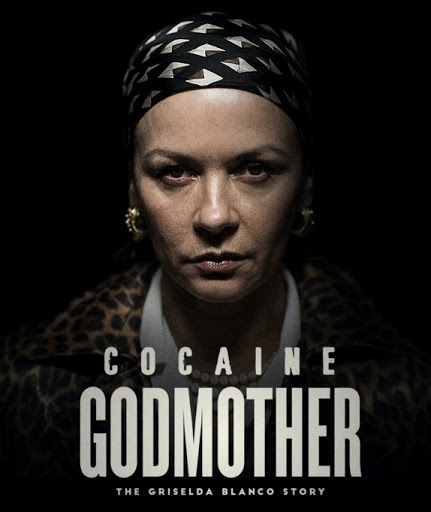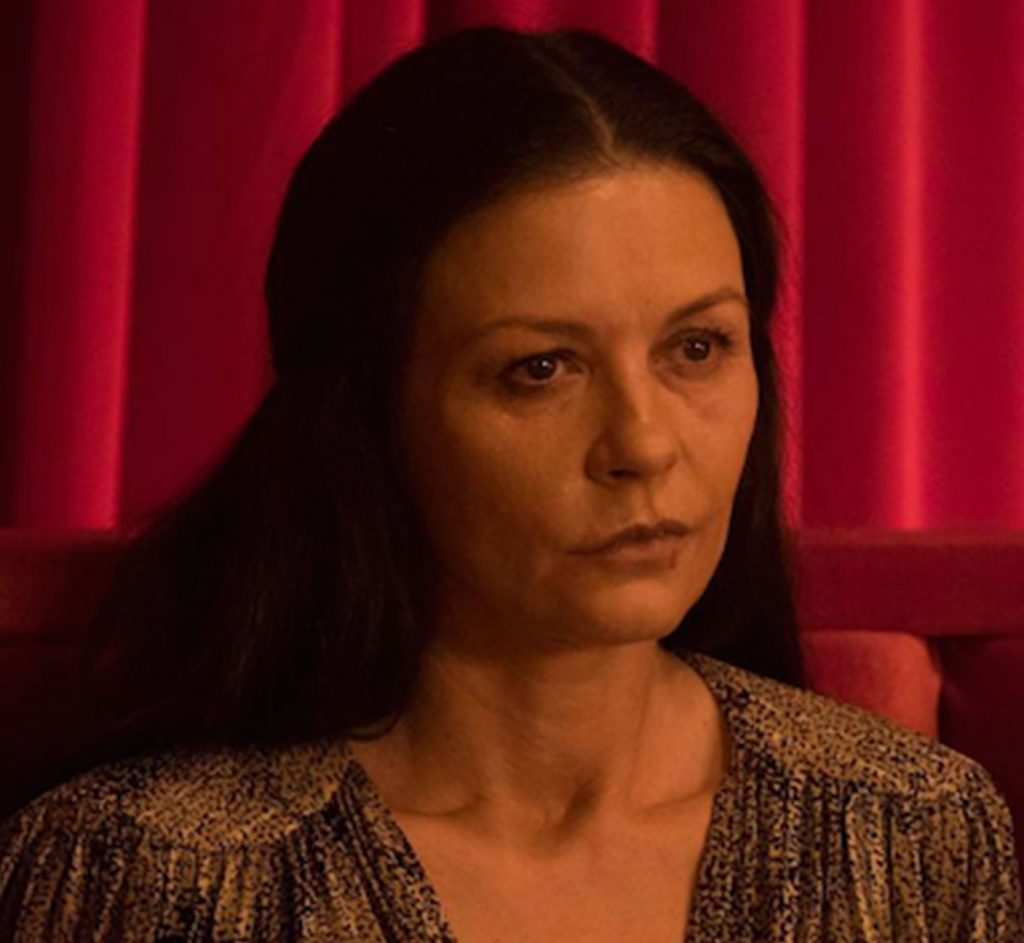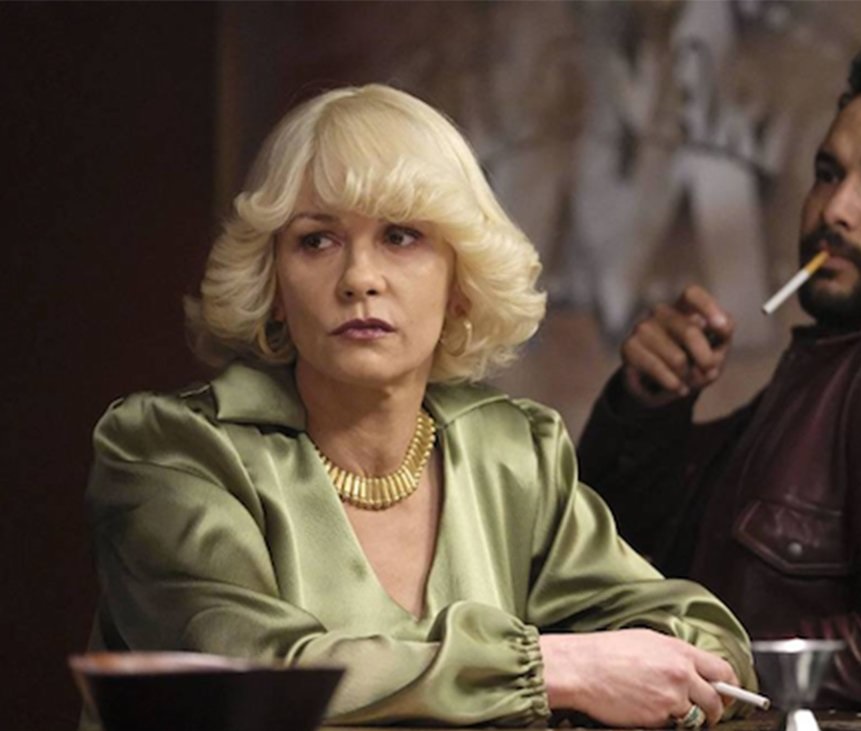Griselda Blanco, known as La Madrina, the Black Widow, the Cocaine Godmother and the Queen of Narco-Trafficking, was a Colombian drug lord of the Medellín Cartel and a pioneer in the Miami-based cocaine drug trade and underworld in the 1970s and 1980s. She was responsible for hundreds of murders while transporting cocaine from Colombia to New York, Miami and California.
On February 20, 1985, Blanco was arrested by DEA agents in her home and held without bail. After trial, she was sentenced to more than a decade in prison but continued to run her cocaine business from behind bars. Upon release, Blanco was deported to Medellin, Colombia. On September 3, 2012, she was shot in the head and killed by a motorcyclist outside a butcher shop.
Wishing to Play Griselda for Years
Catherine Zeta-Jones: I have been wanting to play Griselda Blanco for over three years, in fact, since I first saw the documentary “Cocaine Cowboys,” which she’s not featured in physically, because she was deceased when that was in production. But I found that these men, some of them still in jail, all talked about La Madrina, this woman, the godmother. And they both feared her and revered her. And I was thinking, “My god, what do I know about this woman, in a very dark, dangerous man’s world, who had so much power.

Best Four Weeks of My Life
CZJ: When you find a story like this that has never been done, I just went all out for it. It wasn’t until I sat down with Tanya Lopez at Lifetime A&E, and she said, ‘Are you still obsessed with Griselda Blanco?’ And I went, ‘Yeah.’ And she said, ‘I have a script.’ And I went, ‘You are kidding me?’ And it seemed like, the next minute, I was shooting it, and it turned out to be the best four weeks of my life.
Possessing Power
CZJ: When you look at someone like Griselda, it’s everything in the extreme. She’s a woman of amazing power in a very dark world, where it was very male dominated, very bad-ass male dominated, scary, and she held supreme for many years. And there’s so much about her that I do not morally agree with at all.

I’m Nothing Like Her
CZJ: As an actor, one would always get questions about so, what is a part of you that would bring to this character, because that is what we do and we try to find something that is completely you rooted which you can use. And with Griselda, there was nothing, nothing. I didn’t want to kind of sugar-coat her, I didn’t want to make her nice, or make my audience on Lifetime next Saturday night kind of feel for her because as an actor I relished in the fact that she was none of those things. And so to throw yourself into a character like that and get under the skin of her and not do a caricature of her, was really a reminder of why I wanted to be in this business, why after all these years of being professional since I was nine years old, it instilled in me the joy of acting, of being somebody who you genuinely are not. On a power level, I think power is many, many things, I mean, there are so many clichés of what power is. For me personally, it’s a sense of well being, of being able to be standing, like the way a tennis player stands on the baseline, and that ball can go in any direction, and you are always able to go for it. And power is a strength for me and it’s not something to be abused and so I differ greatly with Griselda. I think she gained her power from many different ways.
Product of Madellin
CZJ: The obvious choice was that she became who she became because she was born in the slums of Medellin, she came from nothing, she had a bad life, she was abused, she was all those things negative that we try to justify what made her the woman she became. And there are many women, not men, from Medellin, at that time, and it wasn’t Medellin that we know and love today, it was bad back then. Unfortunately they were victims of many of the same things that Griselda was, but they never turned into Griselda.
Addictive Personality
CZJ: When she began using it, that was the beginning of the end of her downfall. But the fact that she had that addictive personality, that she would never be able to sustain any sense of normality, enough was never enough and power was never powerful enough. Her feeling of control was never enough. And so that I think comes down to the rudimental fact that an addict has that quality. I get excited that I got to play someone like her. She has been with me for so many years, over four years I tried to get this story off the ground and get to play her. Now I am able to kind of let her go because I was a little bit consumed by her for a long time.
Challenging Role:
CZJ: It’s always interesting to play strength and weakness at the same time. I always like to just find the alternative, play someone like Griselda, who is really the polar opposite morally of everything I believe or try to live in a life or instill in my children. She had power and strength, and I do admire that in her.

Playing Her as She Was
CZJ: I applaud my colleagues at Lifetime and my director, Guillermo Navarro. I was adamant that I didn’t want to put her into the cookie cutter that meant, oh, she wasn’t that bad. Oh, she only did it for her kids. Or trying to justify why Griselda became Griselda or was for so many years, in a man’s world, running the show, doing despicable things. She came from Medellín back then, which is a really bad place. But there’s hundreds and hundreds and hundreds of thousands of men and women who came from Medellín, who came from the same background as Griselda but didn’t turn out like Griselda.











